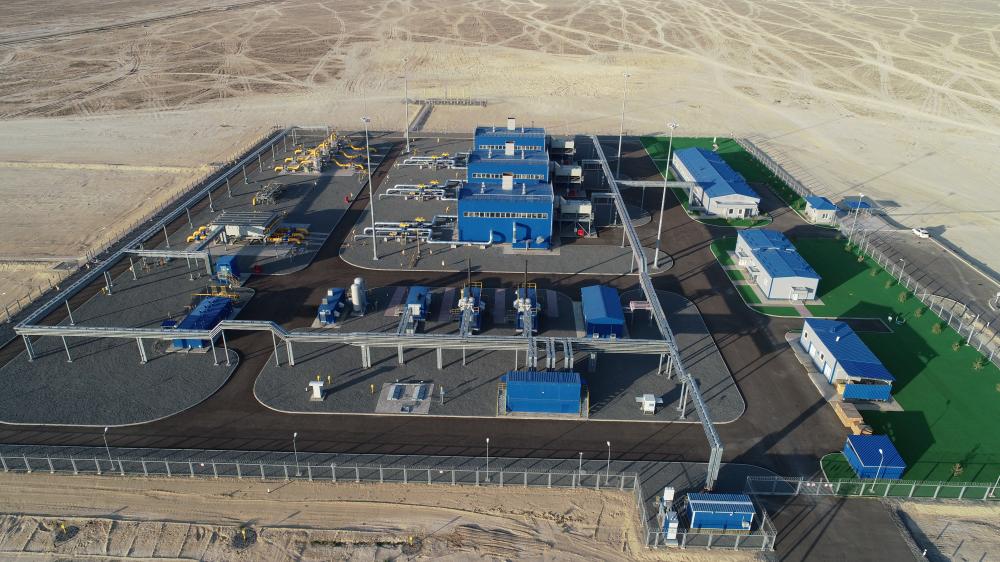
Beineu-Shymkent Gas Pipeline LLP (hereinafter – the Gas Pipeline) is the biggest pipeline project for the history of independent Kazakhstan, and it is intended to play an important role in increasing the energy safety of the country. In accordance with the Message of the President N. Nazarbayev to the people of Kazakhstan dated February 6, 2008, the project is being implemented with the purpose of gasification of the Southern regions of our country, which depend on the gas import. The Gas Pipeline will allow to refuse completely from import supplies of the blue fuel, provide for stability in supplies of energy resources to the internal market of the country and diversification of gas export beyond the Republic of Kazakhstan. Construction and operation of the Gas pipeline will have a macroeconomic and social impact for a number of regions of Kazakhstan, resulting in additional investments in the social sphere and production.
The project is being implemented together with Kazakhstan and China in accordance with the previously concluded intergovernmental agreements, as well as agreements between KazMunayGas NC JSC and China National Petroleum Corporation. Pursuant to execution of these agreements, in December 2010 Beineu-Shymkent Gas Pipeline LLP was established, which accepted the functions of the Project company. The Partnership was established on the basis of equal share participation of two countries in accordance with the legislation of Kazakhstan. KazTransGas JSC is the shareholder from Kazakhstan party, Trans-Asia Gas Pipeline – from China party (shareholder – CNODC company, daughter company of CNPC). The Charter capital of our company amounts to 1 bln US Dollars which is formed by equal contributions of Kazakhstan and China.
The route of the main Gas Pipeline with the pipe diameter 1067mm runs through the territory of Mangystau, Aktobe, Kyzylorda and Turkestan oblasts. The project was implemented in several phases.
The first phase with the throughput capacity up to 6 bln.m3 with the design pressure of 9.8 MPa includes construction of linear part and Bozoy gas metering station (hereinafter – GMS) of the Gas Pipeline from Bozoy GMS in Shalkar region of Aktobe oblast to Akbulak GMS in Sairam region of Turkestan oblast, with the total length of 1143.2km and infrastructure facilities of the Gas Pipeline, such as: Bozoy compressor station CS-1 and shift camp in Shalkar region of Aktobe oblast, emergency-response centers (hereinafter – ERC) Saksaulsk, Aksuat and Karaozek in Kyzylorda oblast and Shornak ERC in Turkestan oblast, as well as construction of the automated process control system (hereinafter – SCADA) and telecommunication (fiber-optic communication line) of the Gas Pipeline in the territory of Mangystau, Aktobe, Kyzylorda and Turkestan oblasts.
In December 2013 linear part and Bozoy GMS of the Gas Pipeline with the total length of 1143.2km were commissioned. Thereunder, Akbulak GMS in Sairam region of Turkestan oblast, Bozoy compressor station CS-1 and shift camp in Shalkar region of Aktobe oblast were commissioned.
The second phase with the throughput capacity up to 10 bln.m3 with the design pressure of 7.4 MPa included construction of the Gas Pipeline linear part with the total length of 306.3km from Beineu settlement of Mangystau oblast to Bozoy settlement of Aktobe oblast, Karaozek compressor station CS-4 in Kyzylorda oblast, Beineu GMS in Mangystau oblast, as well as SCADA of the central dispatch control (hereinafter – CDC) in Kyzylorda, and the Gas Pipeline in the territory of Mangystau, Aktobe, Kyzylorda and Turkestan oblasts.
The linear part of the Gas Pipeline with total length of 306,3 km from Beineu settlement of Mangystau oblast to Bozoy settlement of Aktobe oblast was commissioned in December 2016. Thereunder, on November 29, 2017 Karaozek compressor station CS-4 in Kyzylorda oblast was commissioned.
In November 2018 Central Dispatch Control (hereinafter – CDC) in Kyzylorda was commissioned. In 2019 Korkyt-Ata, Aral and Turkestan compressor stations were commissioned. The Gas pipeline capacity at Bozoy-Shymkent section reached up to 13 bln.m3 per year; design and estimate documentation (DED) has been was developed and purchase of main equipment for construction of the fourth compressor station “1A” is being performed at Beineu-Bozoy section, the completion period is 2020; technical-economic calculation has been developed, DED has been agreed with the participants as per which expansion of the existing compressor station Bozoy and Akbualk and Beineu gas metering stations is assumed.
Beineu-Bozoy-Shymkent Main Gas Pipeline is the second section of Kazakhstan-China Gas Pipeline. The Gas Pipeline connects the Western oil and natural gas fields with the Southern regions of the country, as well as with the main gas pipelines Bukhara Gas-bearing region – Tashkent-Bishkek-Almaty and Gazli-Shymkent and the Line “C” of the Central Asia-China gas pipeline. The actual length of BBS is 1 449,503km, and the throughput capacity is 13 bln.m3 per year. In prospect, it’s planned to expand the Gas Pipeline capacities up to 15 bln.m3, in particular for the export of natural gas to China from Kazakhstan gas fields Urikhtau and Zhanazhol.
Information on the length of gas transportation routes via Beineu-Bozoy-Shymkent MGP from 0km at Beineu GMS to administrative-territorial borders of the Republic of Kazakhstan oblasts (to Aktobe – 121,132 km, Kyzylorda – 360,924 km, Turkestan – 1207,396 km), as well as to Karaozek CS (983,703 km) and Akbulak GMS (1449,003 km).
The Gas pipeline being constructed is the most important strategic project aimed at provision of Kazakhstan South with the domestic natural gas. The project allows diversifying export supplies of Kazakhstan gas, ensures the energy safety of the Republic of Kazakhstan, and creates a unified gas transportation system. With the purpose of its successful implementation, the potential of Kazakhstan suppliers and manufacturers is fully used. The priority is given to them. In the course of construction and operation, the project allowed establishing thousands of new working places, which promotes development of different economic sectors of the country.
